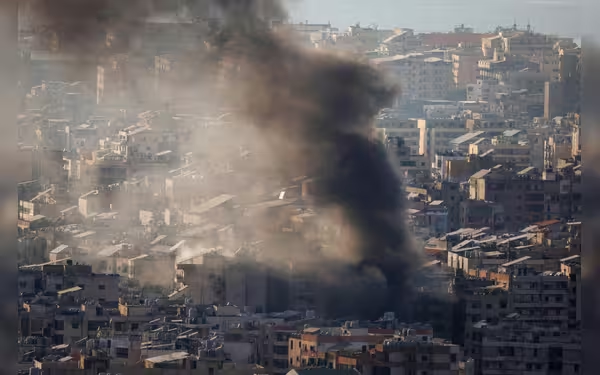Saturday, November 16, 2024 06:49 PM
Lebanon Reports 15 Killed in Israeli Strikes on Hezbollah Areas
- 15 casualties reported in Israeli strikes on Hezbollah strongholds.
- UN condemns Israeli attacks, calls for peacekeeper safety.
- Over 1.2 million displaced amid ongoing violence in Lebanon.
 Image Credits: arabnewspk
Image Credits: arabnewspkLebanon reports 15 killed in Israeli strikes targeting Hezbollah areas, raising international concerns over escalating violence and humanitarian crisis.
In recent days, the conflict between Israel and Hezbollah has escalated dramatically, leading to significant casualties and international concern. On Sunday, Lebanon reported that at least 15 people were killed in three Israeli strikes targeting areas outside Hezbollah strongholds. This surge in violence has raised alarms among global leaders and peacekeeping organizations, highlighting the fragile situation in the region.
Hezbollah, the Iran-backed militant group, has been actively engaged in combat against Israeli forces, particularly in the southern village of Ramiya. The ongoing clashes have resulted in injuries to UN peacekeepers, with a third member wounded in the latest Israeli attacks. The United Nations Interim Force in Lebanon (UNIFIL) has condemned these strikes, calling them a "serious development" and emphasizing the need for the safety of its personnel.
International reactions have been swift. France, along with Italy and Spain, has labeled the Israeli attacks as "unjustifiable," while US President Joe Biden has urged Israel to avoid targeting UNIFIL forces. Russia has also expressed outrage, demanding that Israel cease its hostile actions against peacekeepers. These statements reflect a growing concern over the potential for further escalation in the region.
On the ground, the situation remains dire. Israeli military operations in Gaza have resulted in the deaths of at least 29 Palestinians, with reports indicating that thousands are trapped in the Jabalia area due to ongoing bombardments. The Israel Defense Forces (IDF) have claimed that Hezbollah fired nearly 320 projectiles into Israel, prompting evacuation orders for residents in 23 southern Lebanese villages.
As the conflict continues, the humanitarian toll is staggering. The Lebanese government estimates that over 1.2 million people have been displaced, with more than 2,100 casualties reported since the fighting began. This toll includes many innocent civilians, underscoring the tragic consequences of the ongoing violence.
In light of these developments, the Middle East remains on high alert. The potential for further military action looms, especially following an Iranian missile barrage on October 1, which was reportedly in retaliation for the assassination of a Hezbollah leader. US officials have indicated that Israel may focus its military efforts on military and energy infrastructure, but there is no clear indication of when or how these actions will unfold.
As the situation evolves, the international community is calling for a diplomatic resolution to the conflict. US Defense Secretary Lloyd Austin has emphasized the need to shift from military operations to a "diplomatic pathway" as soon as possible. This sentiment is echoed by many who believe that dialogue and negotiation are essential to achieving lasting peace in the region.
The recent escalation of violence between Israel and Hezbollah serves as a stark reminder of the ongoing instability in the Middle East. With lives at stake and the potential for further conflict, it is crucial for all parties involved to prioritize diplomacy and seek a peaceful resolution. The world watches closely, hoping for a de-escalation of tensions and a return to stability for the people affected by this enduring conflict.













